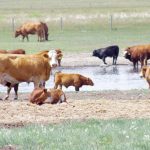Over the past five years, I hope to have convinced some to gather a nest egg in stocks, whether in a TFSA, RRSP or a taxable account. I am curious if you have started because of what I have written and how many are following the Titanium-Strength Portfolio (TSP). Please send a short email to [email protected]. I would love to hear from you.
As I was preparing slides for a keynote address to a farm audience, I pondered the question in this column’s title. Farmers take on a lot of risk in their businesses and are already more than busy. In part, I hope those aspects have been addressed by the TSP, with its 46.3 per cent gain in four and a half years, and its only activity being reinvestment of dividends. The purpose of setting up this model was to demonstrate how little effort is required to achieve excellent results.
What other reasons would there be for venturing into the world of stocks?
Read Also

Avoid these thought traps when investing
Investing for Fun and Profit: Let’s review a list, by renowned fund manager Peter Lynch, of the most dangerous things that stock market investors can say to themselves, or to others.
READ MORE: How to ask for better compensation on the farm
A key non-financial reason could be that investing in stocks brings with it a learning opportunity about business and economics. This knowledge could then be applied to the business of farming.
Would a better understanding of oil markets or how commodity markets are affected by the business cycle be helpful? Could corporate profitability metrics of return on equity, return on assets and cash flow/assets be applied in evaluating the financial side of your farm operation? How does your farm compare with other capital-intensive businesses?
Stock investing provides a productive distraction from the farm. Sometimes we overfocus on a problem. When we move our mind off of it and onto something else, we often find solutions to what we were originally focused on. The French have a saying, “Changer les idées,” which literally translates to change ideas, but really means to take your mind off of something, do something different for a while.
A key reason I do my writing is to help improve financial literacy, which isn’t strong amongst Canadians. Farmers as business owners would have greater literacy than most, but there is always room for improvement. If Canadian financial literacy was stronger, I think we would elect politicians with stronger financial literacy for everyone’s benefit.
In the past, I discussed the benefits of tax-free compounding inside a tax-sheltered account, like a TFSA or RRSP. Both programs create a pool of growing assets separated from the farm. This pool can grow faster than expected. This year our TFSAs had accumulated about $13,000 in tax-free dividends, and combined with our 2023 contributions, we purchased an additional $26,000 of stocks.
Early in my career, I was focused on real estate investing, which like farming is a capital-intensive business. Even so, rather than be all in on real estate, I always maxed out our RRSP contribution and our RESP and TFSA contributions, when the programs became available. I had a hard time seeing anything do better than the tax-free compounding with stocks. Eventually, I tired of all the work real estate required and realized the ease and superb returns with stocks.
READ MORE: Interest rate herky-jerky
While the original intent of my writing efforts was to help the younger generation get off to a better financial start, over the years I have found a lot of interest amongst people close to or in retirement. Investing in stocks provides a productive pursuit, which helps keep the mind sharp with all of the related health benefits that come with an active mind. For those, like farmers, who have been very active throughout their lives, stocks as a part-time pursuit in retirement provides a “work when you want” opportunity. With my retirement from the seed business, I’m not sure how I would fill every day if I didn’t have this pursuit.
I realize not everyone finds the world of stock investing as fascinating as I do. When I began, I wasn’t nearly as intrigued as I am now. I started solely for the purpose of deriving better returns than interest-bearing investments. Only in time did I grow more fascinated by the endless learning opportunities, and how all of the puzzle pieces of our modern economy fit together.
The underlying goal is to make money and grow your asset base. On a nominal basis $1.00 invested in U.S. stocks in 1900 compounded at a rate of 9.5 per cent and was worth $70,211 in 2022. A dollar in bonds compounded at 4.7 per cent to become $269 and a dollar in cash (T-bills) compounded at 3.4 per cent, becoming $60. Naturally we should subtract out inflation, which averaged 2.9 per cent. On a real return basis, a dollar in stocks grew to $2,024, compared with bonds at $7.80 and cash at $1.70 (this information can be found in the Credit Suisse Global Yearbook). While 122 years seems like a long time, it is only twice our investing lifespan, if we are active from the age of 20 until 80.
















